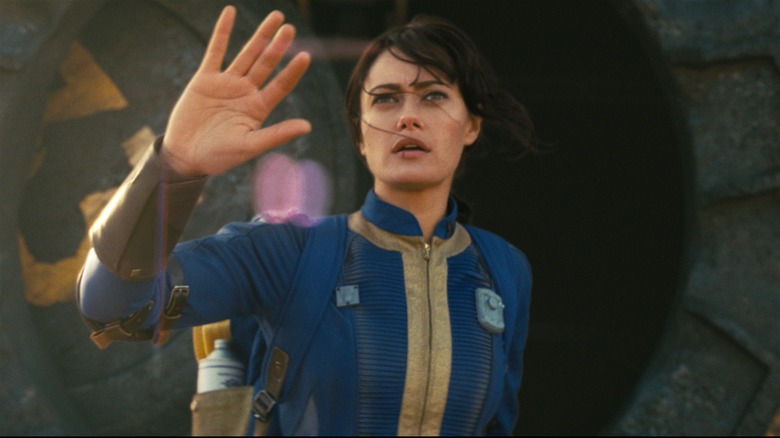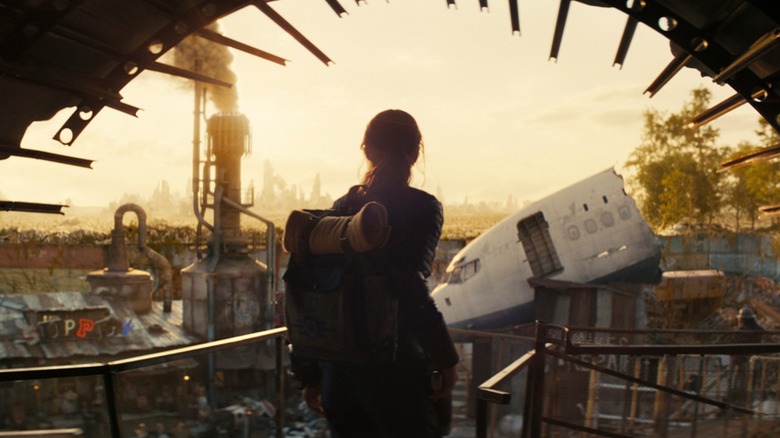Fallout's Jonathan Nolan Wanted To Avoid One Major Post-Apocalyptic Trope
There is a lot to love about the "Fallout" video game franchise. The series' retrofuturist, post-apocalyptic world combines bizarre elements to meld together hope and despair, where the ruins of a bygone era give way to the promise of a better future. "Fallout" has always been darkly comedic, where the humor shines through even in the bleakest moments of a society adjusting to its post-war status, where survival demands a certain degree of brutality. Showrunners Geneva Robertson-Dworet and Graham Wagner, along with series creators Lisa Joy and Jonathan Nolan, deeply understand this essential aspect of "Fallout," which they have gone on to painstakingly recreate in their upcoming television adaptation of the video game franchise.
The "Fallout" TV series is not a recreation of any of the franchise's video game titles, but a story set in the same world that benefits from the rich, intriguing lore of the source material. The Prime Video show will hone in on the aftermath of an apocalyptic nuclear event, where the wastelands of Los Angeles prove to be hostile and unpredictable for individuals eager to venture out into a world on the cusp of change. Jonathan Nolan spoke to The Hollywood Reporter about this highly-anticipated series, explaining how it was crucial to capture the "hybrid of dark, mythic and violent but also funny, satirical" strains of the franchise to craft an original tale that builds itself on the hyper-specific post-apocalyptic ethos of the "Fallout" games.
While almost all post-apocalyptic stories are characteristically bleak, Nolan wanted to stay true to the "hybrid" tone of "Fallout" that frequently mixes dark humor and satire with resigned desolation, subverting established genre tropes in the process.
The Fallout series' post-apocalyptic world is not dour
As comic relief is an integral part of the story, Nolan had to approach the script with a certain amount of flexibility, as "Fallout" is not just a tale about the end of things as we know it, but the advent of a new era that is morbid, wacky, and hopeful in its own right:
"It's also the closest I've come to working with comedy in my career. We're usually a word-perfect production — you have the script, it's been worked on meticulously, let's shoot what's on the page. With comedy, you have to be more flexible. You have to embrace the chaos a little bit ... We're in a moment right now, where things are so fu**ing dire in the world, that to have a show that doubles down on that would be a little scary. One of the things about 'Fallout', it's not the end of the world, it's about all these beginnings for a new world.
Nolan also went on to emphasize the importance of a post-apocalyptic tale that does not "feel dour" even when depicting something terrifying, such as the treatment of overwhelming bleakness in "Fallout 3," which is perenially interspersed with dark humor and sharp satire:
"The sense of humor and irony [in 'Fallout 3'] and the cutting level of satire and this depiction of an Eisenhower-era America that never lost its swagger that kept lumbering forward ... it just had a unique tone. It's political. It has a crazy point of view, and it's crazy violent."
The hope for a new future, and the possibility for mankind to "adapt and move on" is essential for a post-apocalyptic drama like "Fallout," which is set to premiere on April 11, 2024, on Prime Video.

